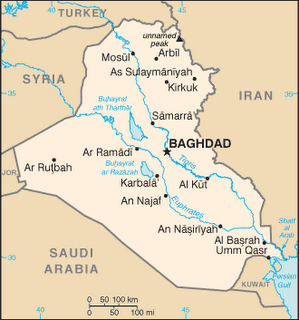Ex-Diplomat: No Mention of 'Civil War,' 'Failed State' By Iraq Study Group

The much anticipated Iraq Study Group report lays out a number of recommendations for U.S. involvement in the nearly-four-year-old war -- but there are important and troubling concepts it sidesteps, a former U.S. diplomat says.
The bipartisan group this week delivered to the White House and Congress its analysis of new directions for U.S. policy in Iraq.
"One thing the report does not do, it doesn’t address or raise four words. Two of them are civil war and two of them are failed state," says Carlos Pascual, a former U.S. State Department official and U.S. ambassador. "And I think it’s important to put these issues on the table. On the question of civil war, what we have learned from recent history is that civil wars are settled through political solutions.
"We’ve learned this in Northern Ireland and Bosnia and Kosovo and Congo and the Sudan. It’s not that force is irrelevant. It’s not that the use of force cannot actually support or push for a political settlement. But force alone is not adequate to establish a sustainable peace. And that is indeed what underscores the importance of having some form of political and diplomatic initiative," he continues.
"And we’ve seen painfully in Iraq and in other areas, that as long as there are terrorists and insurgents and guerillas who are willing to accept as an interim outcome violence and chaos and instability, then they can continue to sustain that for almost an indefinite period of time. It also reinforces why it is important to bring the regional actors," Pascual adds, referring to such nations as Iran and Syria. "Because if we ask the question 'who has sway over militias and insurgents,' inevitably we have to go back to some of those regional actors to engage them."
The potential of Iraq to become a "failed state" is also important to consider, Pascual says, because Iraq's leaders cannot currently protect its people, deliver services, collect revenue, create an environment for economic activity, or establish the rule of law.
"It’s in Iraq where sectarian militias increasingly control or have an influence on the police forces, the security forces, and the government itself. Yet at the same time, fundamental premise of the report is that more responsibility should be turned over to the Iraqi government," he says.
"One needs to look at this very carefully," Pascual warns. "Because on the one hand, we know that Iraq’s future must be determined by Iraqis. But we also have to be realistic about expectations and what will happen if additional responsibility is placed on Iraqis at this time and in particular, if additional responsibility for security is placed on a security force that is dominated by sectarian groups."


0 Comments:
Post a Comment
Subscribe to Post Comments [Atom]
<< Home